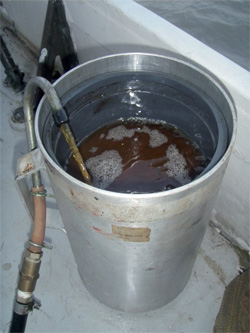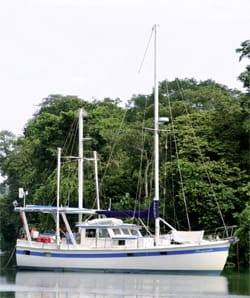How many of us have taken for granted that all diesel fuels are the same and that all diesel mechanics know what they are doing? Diesel engines are amazingly tolerant of abuse. But life isn’t that simple when you are sailing the seven seas and the Caribbean is no exception. Let’s look at the fuel side, first.
Diesel fuel in the Caribbean usually comes from the refineries of either Trinidad and Tobago or Venezuela. As a rule, the fuel is clean and consistent. (The same cannot be said for Brazilian fuel, which has caused us no end of problems on our power voyaging boat Passagemaker when we cruised the Brazilian coast.) Biocides are not added to any fuel in the Caribbean by the refineries, so if you plan to park your vessel for any period of time, it’s a good idea to add a biocide. Fuel prices range from 25 cents per gallon in Venezuela to $6 per gallon in many islands. But don’t think you can fill up your 2,000 gallons of onboard storage in Venezuela, as the aforementioned price is strictly for domestic consumption. Under the late President Hugo Chávez, even Venezuelan nationals were made to pay “international” prices for refueling their motor yachts.
However, individuals from Venezuela’s offshore islands and many Caribbean islands will approach you to sell cheap diesel, which is brought alongside in 40-gallon barrels and pumped on board by hand. Experience suggests that the best approach is to keep one tank for receiving such suspect fuel; then you pump it through some good filters before you add it to your main tanks. We use a Baja filter, which removes not only dirt and algae, but also water.
You should bring a good stock of the type of fuel filter your engine requires, as one 500-gallon tank of dirty fuel will clog up a lot of filters. (For our engine on Passagemaker, we favor the Racor 2010SM 2 micron, at less than $8 each, which you can purchase by the case from Amazon, rather than the Racor R24S, also 2 micron, which cost more than $30 each!)
 |
|
A Baja filter for cleaning diesel fuel. |
Another major reason for changing the fuel filters at very regular intervals is fuel burn. Dirty fuel burns badly, causing the injectors to foul up which means your fuel consumption soars. It can easily double, as we learned on Passagemaker. At $6 a gallon, filters suddenly look very cheap. It’s also a good idea to carry a spare set of clean injectors in case you notice your consumption rising even though you are changing the filters. Nothing can spoil a major cruise more than having to find thousands of unbudgeted dollars for buying additional fuel.
Diesel mechanics
So, you have your fuel and you have it nicely filtered, but there is a horrible knocking noise coming from somewhere in the engine. It sounds like an expert is required. First, there are a couple of rules of thumb about diesel mechanics in the Caribbean. They are definitely not all created equal, and the fact that the said diesel engine is in a boat will triple or quadruple the price. How you tackle the problem depends largely on how much time you have.
If you are in a rush, then the best advice is to go to the owner of the most expensive boat in the marina and ask him to recommend a good person. Be careful of taking advice from marina owners, because often they have serious conflicts of interest. The person they recommend may be family or some close childhood friend. Competency is irrelevant in this situation. Some marina owners only recommend mechanics who give them a 10 percent kickback.
If you have time, then ask around. Yes, visit the owner of the luxury motor yacht, but also ask people who have craft more similar in size to yours. Go on the Internet, describe your problem and chat with other boat owners. You would be amazed how many people have probably had the same dilemma.
Self-reliance helps
We were in the Paramaribo River in Suriname when all of a sudden our six-liter Ford Dover engine seized up. We could not get it to turn over for love nor money. Fearing the worst, we removed the cylinder head to find nothing amiss. Next step was to remove the gearbox and, sure enough, there was the problem. One of the springs from the torsion plate had disintegrated and a small shard had jammed between the flywheel and the bell housing. One month later we met a fellow cruiser with a similar sounding problem. We shared our experience and the next day he called to say he removed the gearbox to find that the same spring had broken and jammed the flywheel. Within a few hours his engine was purring like new. And this was after no less than four so-called experts had told him they would have to remove the engine to strip it down.
Sadly there are almost no technical colleges to train mechanics in the Caribbean. As a result they will all tell you that they can fix any engine and then often proceed to “learn” at your expense on your engine. The Caribbean is knee-deep in horror stories of bush mechanics that have stripped engines down and rebuilt them in a worse condition. Ninety-nine percent of them have never even seen a torque wrench, let alone used one.
If you have the time and you have a trusted mechanic back at your home base, offer him an all-expenses paid trip to the Caribbean in return for working on your engine. A return air fare is typically less than $1,000 from the U.S., which is pennies compared with not only the cost of repairing your engine, but also the sheer frustration of dealing with an incompetent mechanic.
Interpreting meaning
This brings us to the other fact of life you need to understand. The lingua franca of the Caribbean is by and large English, but do not expect the words to mean the same as to which you are accustomed. “No problem” does not mean “I understand what is needed; I have the resources and the time and will solve the problem.” It is more likely to mean “I think I know a guy who might have an idea of what is needed, but I’m not sure where he is living so it may be a while before I can find him.” Similarly, “First thing tomorrow” really means “Provided no one else wants me and provided the traffic isn’t too bad and provided my wife isn’t ill … I will be there sometime in the morning.”
Now having said all that, there are good mechanics on most islands. But everyone else knows they are good so they are swamped with work. Plus on many islands it is considered rude to say “No,” as in “No, I’m too busy to help you.” As a result they will make promise after promise to come and sort your problem out and let you down time after time. Your best bet is to find out where they live, rent a car and go and pick up your man first thing in the morning. When he says he just needs to pop out to get something you tell him that you will take him and bring him back, otherwise he will disappear for the day.
How do I know all this you might ask? After living in the Caribbean for 38 years, you get to know these things.
—————–
The author, Peter Quentrall-Thomas (quentrall@gmail.com), was last seen regaling guests with sailing yarns at his Amazon Lodge in Trinidad (www.amazonlodgetrinidad.com). He plans to take his historic motor yacht Passagemaker 1,200 miles up the Orinoco in 2015. You can read more details at www.passagemaker.org.

